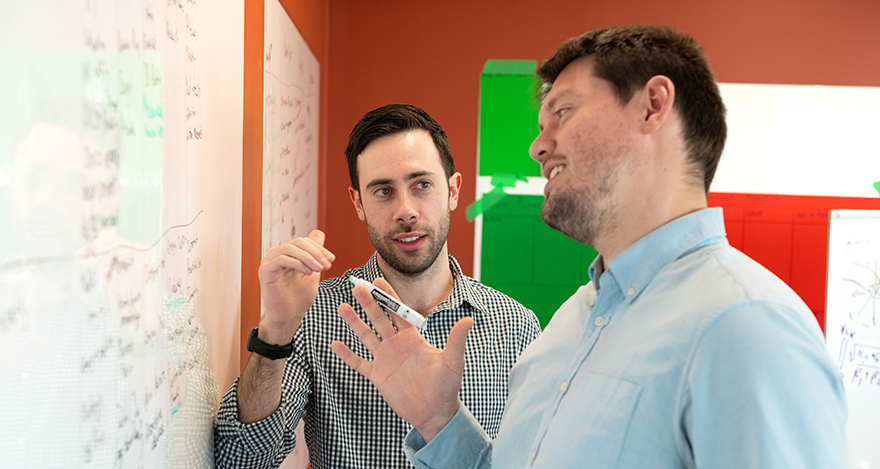Fellowship drives innovation in solving patient challenges
 Dr. Cody Jackson (left) and Oleksiy Zaika, PhD candidate, in the department of anatomy & cell biology - part of the MIF program.
Dr. Cody Jackson (left) and Oleksiy Zaika, PhD candidate, in the department of anatomy & cell biology - part of the MIF program.
By Cam Buchan
Think you’ve got the chops to solve a pressing health care need? Western’s Medical Innovation Fellowship (MIF) may be for you.
The 10-month program helps turn ideas into innovation by providing budding medical entrepreneurs with a proven process to identify important health-related needs and filling those gaps through creating novel solutions.
Under the banner of WORLDiscoveries, the Western Medical Innovation Fellowship (MIF) program immerses fellows, scientists, and engineers in training and research environments that inspire new medical technologies. Recruitment for the next session closes on February 20, 2023, and the program begins in mid-August 2023.
“There is no other program like it in Canada that brings together this community of fellows and collaborators, educates them experientially, and provides them with the means to commercialize their innovation. The exceptional research and collaborative landscape at Western are what make this program one-of-kind,” said Souzan Armstrong, PhD, executive director of WORLDiscoveries, the business development office for Schulich School of Medicine & Dentistry, Robarts Research Institute and Lawson Health Research Institute.
“Through the fellows, these innovators are engaging with the problem at the patient level,” said Armstrong. “That means patients are getting a solution that is very relevant to the problem they are facing.”
The program gathers aspiring entrepreneurs, including physicians, dentists, engineers, and scientists, into a cross-disciplinary team. The group observes doctors, nurses, other medical health professionals and technicians in a clinical setting, such as an operating room, and collectively creates solutions to fill some of the health-care gaps they identify.
From experiential learning in the classroom, access to first-class industry expertise, through the clinical environment to prototyping, possible commercialization and networking, a fellowship in the program is the ideal place for prospective entrepreneurs.
“It’s for people like me who are interested in entrepreneurship, but didn’t really know where to go with that energy and drive,” said Oleksiy Zaika, PhD candidate, in the department of anatomy & cell biology at Schulich Medicine, who completed the program last year and has returned to provide mentorship to the new fellows. “The program provides a foundation in entrepreneurship, as well as an opportunity to discover where entrepreneurship can take you within the health-care space.”
Dr. Cody Jackson is a part-time fellow in the current cohort and has appreciated the opportunity to connect with individuals with diverse talents.
“I know that doctors are very good at medicine, and we’re pretty good at coming up with ideas. But we don’t always know how to bring those ideas to life,” said the practicing physician and professor with the department of family medicine at Schulich Medicine. “Through this program, I have met people who could fill in the gaps in my knowledge.”
Diverse backgrounds. Different lenses. Unique outcomes
“The biggest advantage is being able to sit in a room with people from radically different backgrounds and approach a topic through different lenses and bring a huge variety of opinions, perspectives, and expertise to tackle a patient problem,” said Jackson.
Zaika’s 2021 MIF fellowship cohort identified that in many amputees with lower limb amputations, the sockets that are specifically molded for them begin to lose their fit because of limb volume changes leading to painful sores and even abandonment of prosthetic devices.
“What was needed were affordable, automatically adjusting sockets for this large population that wasn’t being taken care of properly,” Zaika said.
Zaika and co-founder from the fellowship, Sydney Robinson, are taking a novel socket design to market through their start-up Vessl Prosthetics, which is currently in the BioNext incubator at Roberts.
Find out more about some of the startups that have developed from the MIF program. Support comes in part through Western BrainsCAN who has committed more than $3.5 million to the program.







